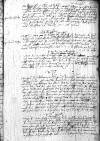Letter #3956
Ioannes DANTISCUS to [Gdańsk Town Council?] & [Thorn Town Council?]Heilsberg (Lidzbark), 1543-11-13
Manuscript sources:
| ||||
Text & apparatus & commentary Plain text Text & commentary Text & apparatus
 AAWO, AB, D. 7, f. 15r (c.p.2)
AAWO, AB, D. 7, f. 15r (c.p.2)
Was die quittancz anghet / die in ko(nigliche)m cf.
